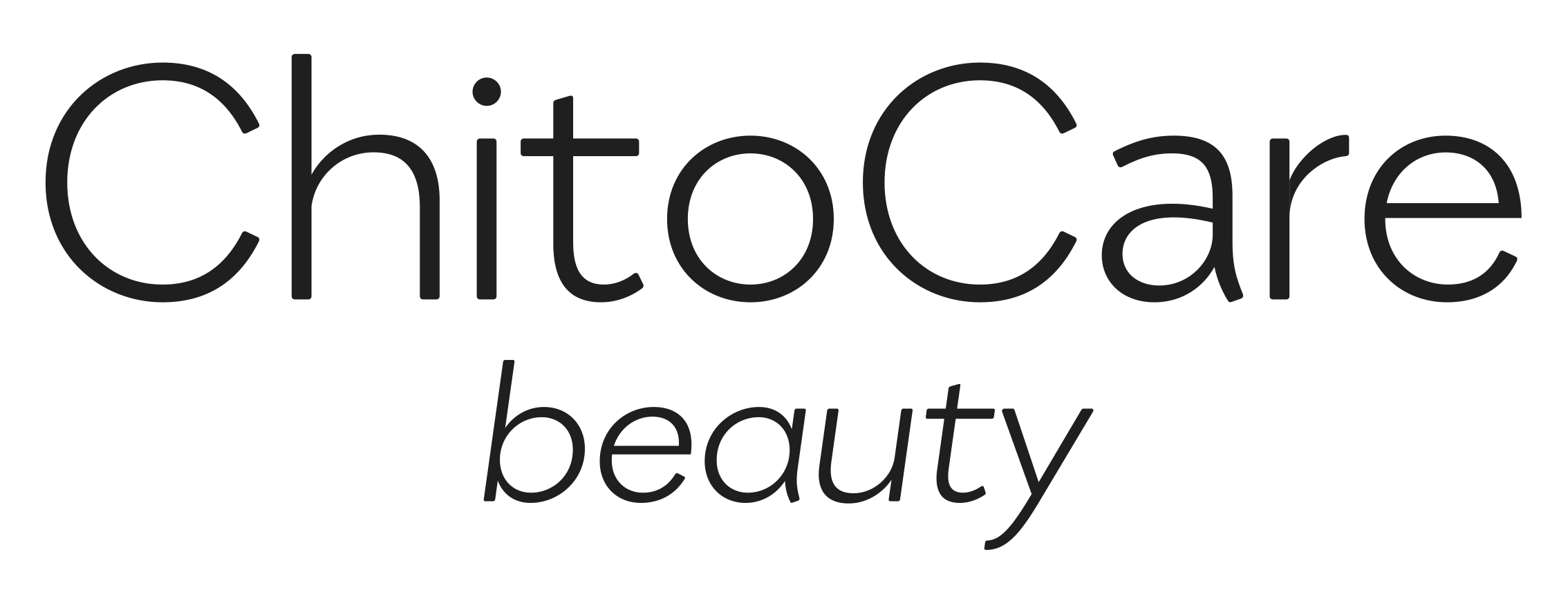
All You Need to Know About Collagen & Elastin
Collagen and elastin are what make our skin plump, elastic and supple. As we age, their biosynthesis slows down and signs of extrinsic aging start to appear. At ChitoCare beauty we know how important it is to maintain sufficient levels of both collagen and elastin and have developed our skin care line with this in mind. Read on to learn more about these healthy skin building blocks.
The dermis is the middle layer of the skin and makes up 90% of skin’s thickness. This is where collagen, elastin, hyaluronic acid and fibroblast are found. Among other things, the dermis is responsible for the creation of oils that keep your skin soft and smooth, for regulating your body temperature by releasing sweat through skin pores, and for providing you with tactile information about the outside world through nerve receptors. Keeping a healthy dermis layer is important and that includes the production of collagen and elastin.
What are collagen and elastin?
Collagen is a protein naturally produced by our body and is what literally holds us together. Making up 30% of the body’s total protein content, the word comes from the Greek word “kola”, which means glue. Elastin is a connective tissue protein that provides skin with its elasticity and ability to recoil. If collagen keeps cells strong and connected, elastin lends flexibility and resilience. Along with silicon, the element making up natural silica sources, they are the major building blocks of our organism and work to structure and maintain healthy and youthful skin.
What do collagen and elastin do?
There are over 30 types of collagen that hold everything together. Type I accounts for the vast majority of our body’s collagen, a whopping 90%, and is what provides structure for our bones, tendons, ligaments, teeth and skin. Type II is part of cartilage, bones and connective tissues, and reduces inflammation in joints, keeping them lubricated with elastic cartilage. Type III collagen is what gives muscles, organs and arteries support and assists with wound healing and tissue formation.
Elastin is a fundamental component of the extracellular matrix in our organs and connective tissues. Elastin fibers are what provide our skin and other tissues with bounce. When your skin recoils back to its original shape after you have pinched it, that’s due to elastin, which is about 1000 times more flexible and pliable than collagen. Stretch marks are a perfect example of skin that has broken elastin fibers.
What damages collagen and elastin production?
Collagen and elastin production slows down naturally with aging. This compromises the structural integrity of our skin, resulting in premature aging. Side effects of reduced collagen and elastin biosynthesis include wrinkles, fine lines, loss of elasticity, roughness, puffiness, soreness or dehydrated skin.
Sadly, collagen and elastin biosynthesis not only slow down as we age, but existing fibers can degenerate and suffer damage from external aggressors as well. Extrinsic aging causes the outer layer of the skin (called the epidermis) to loosen and unravel and, when these dermal fibers break down, the skin starts to sag, stretch and lose its ability to bounce back.
The number one culprit for elastin loss is exposure to sunlight. Stress, UV radiation, pollution, blue light overexposure, smoking, overconsumption of sugar and saturated fat, and lack of sleep can all lead to reduced levels of collagen and elastin and a proliferation of free radicals in the body. Free radicals cause oxidative stress that in turn disrupts the skin’s natural protective barrier and the production of collagen and elastin.
How can I protect my collagen and elastin?
There are several ways you can strengthen your network of elastin and collagen fibers. Supplement your oxidant defense and dermal nutrients with ChitoCare beauty Hair, Skin & Nails, rich in marine collagen complexed with glycosaminoglycans, chitosan, zinc, Vitamin C, geothermal silica, selenium and algal minerals such as calcium and magnesium.
Protect yourself from the sun
Limiting sun exposure and wearing sunscreen with SPF 30 or higher are two of the most significant ways you can prevent your skin from long-term damage. After spending time in the sun, treat your skin to necessary moisture by lathering up with ChitoCare beauty Body Lotion, providing great antioxidant protection while deeply moisturizing the skin for a more supple and smooth texture.
If you feel hot or burnt after sitting in the sun, soothe and cool your skin with ChitoCare medical Healing Spray. Apply as soon as possible on sunburned areas and as frequently as needed to reduce inflammation and skin damage. It will help scavenge free radicals and pro-inflammatory compounds produced during the sunburn inflammation process.
Fill up on antioxidants
Changing your diet to include foods rich in vitamins and antioxidants will feed your skin with nutrients that fight free radicals. Drinking enough water is also a marvelous way to wash out toxins from your body and keep your skin hydrated from the inside. To hydrate externally, apply ChitoCare beauty Face Cream, suitable for both day and night, containing chitosan, macadamia oil and anti-aging Pseudoalteromonas Ferment Extract.
Quit smoking
Smoking is also highly damaging for the skin and tobacco products are known to contain free radicals. What’s more, smoking tightens blood vessels, limiting blow flow and the access of oxygen and nutrients to the skin, depleting it of all the necessary elements it requires to remain healthy and youthful. Quitting will help you prevent the ongoing damage smoking causes to skin, lungs, heart, blood vessels and overall health.
Incorporate an exercise routine into your weekly schedule and boost energy levels with ChitoCare beauty LipoSan Fibers & Vitamin C, that provides powerful antioxidant protection and contributes to your dietary fiber regime.
Thanks to advancements in science and technology, we now know that healthy skin is the result of both internal and external nurture. Making sure you replenish your skin internally and externally will help you achieve firmer, more supple skin with bounce and a youthful glow.


